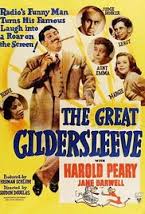Around 10 years ago, after a friend’s suggestion, I stumbled across the Old-Time Radio network Antioch Broadcasting Network (ABN). Prior to that time I had never really listened to radio for anything other than music or talk radio. I’ve always liked classic television, so it was to be expected that I immediately followed the various crime or detective stories broadcast on ABN.
With radio programs, outside of a very limited amount of sound effects, the voice acting is the integral part to whether the story reaches its intended target. With these shows taking place primarily before the invention of television, the best actors were still in radio and it showed. In those days the advertiser actually had control of the programming as opposed to the show or network calling the shots. Companies such as Kraft Foods (sponsor of The Great Gildersleeve) had their own stable of actors and programming that was under company control. The concept that the company being promoted during commercial breaks is actually the driving force behind the radio program itself is almost absurd to think about in comparison to today’s television programming.
After my initial interest in crime dramas I started to listen to several situational comedies. At first I was a reluctant listener but then the characters started to grow on me, somewhat unexpectedly. The show that stands out the most to me in the group of early radio sitcoms is The Great Gildersleeve.
T he show started as a spin-off (it’s actually one of the first broadcast spin-offs of all time) of one of my least favorite shows: Fibber McGee and Molly. The main character, Throckmorton P. Gildersleeve, was played by Harold Peary. The character started as a neighbor of Fibber McGee and became so popular with listeners that Kraft Foods (the show’s sponsor) decided to give Peary his own show.
he show started as a spin-off (it’s actually one of the first broadcast spin-offs of all time) of one of my least favorite shows: Fibber McGee and Molly. The main character, Throckmorton P. Gildersleeve, was played by Harold Peary. The character started as a neighbor of Fibber McGee and became so popular with listeners that Kraft Foods (the show’s sponsor) decided to give Peary his own show.
The premiere episode was August 31st, 1941 and I’ll be honest, the initial story line is not the greatest. Gildersleeve is single businessman (owner/operator of Gildersleeve Girdles) who has to leave his business and move to a town called Summerfield to take care of his recently deceased brother-in-law’s children. This part of the plot is very vague and is never really touched on again. It is just accepted that there is an odd living arrangement where Gildersleeve is the new guy in town, taking care of his adolescent niece and nephew.
Most of the initial storylines revolved around the kids, Leroy and Marjorie, getting to know their uncle. The household also had a housekeeper named Birdie. Marjorie is a teenager when Gildersleeve arrives and several early episodes centered on the latest love interest or teenage girl issue. Throughout almost the entirety of the show, Leroy remained 10 years old. The voice actor that played Leroy was actually an adult from the very beginning. He specialized in a teenage boy character’s voice and apparently did quite well at it. Because of the consistent age, most Leroy stories were similar to a Tom Sawyer-esque approach. Leroy and a revolving cast of friends were always up to something mischievous.
There was no doubt however that the focus of the show was Throckmorton P. Gildersleeve. Harold Peary, the actor that played Gildersleeve, was a very good singer and his singing ability was often a part of the theme of the episode. The character was also overweight for the 1940’s, so there were always comments about his weight from his arch nemesis Judge Hooker. Gildersleeve had a very distinct laugh that would be impossible for me to describe. The laugh was so unique that it became the calling card of the show. With Gildersleeve being a bachelor his love life was a constant work in progress. In a very fluid love interest character role, Leila Ransom was the most reoccurring character.
Since the show was in its prime during the start of WWII, it was inevitable that the war shaped a large portion of the show. I still remember the night I was listening to an episode when there was an interruption in the broadcast and a news anchor announced the bombing of Pearl Harbor. I listened to that episode multiple times that night just imagining what a listener in 1940s America would have thought tuning in expecting to hear Gildersleeve chasing a girl, never realizing that their entire world was about to change. The following episodes of the show contained plugs for war bond drives, rationing, soldiers returning from overseas and many other war time themes. These episodes were a peek into a time long forgotten by many, even though it was a simple family comedy that I don’t think ever intended to be anything more than just that.
OTRR LIBRARY – THE GREAT GILDERSLEEVE
The show continued into the 1950s and by this time Harold Peary has been replaced by Willard Waterman because of a contract dispute. I have listened through all 552 episodes of the show, all the way through 1954. In my opinion the show ended with Harold Peary in 1950. No offense to Willard Waterman but he was simply a person doing a bad impression of Harold Peary playing the Great
Gildersleeve. While many of the main characters like Judge Hooker, Peavy, Marjorie and Leroy continued in the series, the show was never the same and I believe the ratings are evidence of that. The series also had a short lived run as a television series and also several feature length movies.
I’ll admit that I started this series with a very strong dislike of its storyline and the main character but for some reason it just grew on me. I found it to be a good stress relief in the hustle and bustle of today. The characters are genuine and the wartime setting made the show very memorable for me. I suggested it to my wife and she reluctantly fell into the trap, all the way up to the Willard Waterman years (Willard Waterman!!!). Seriously though, if you are looking for some easy listening give this series a try…



